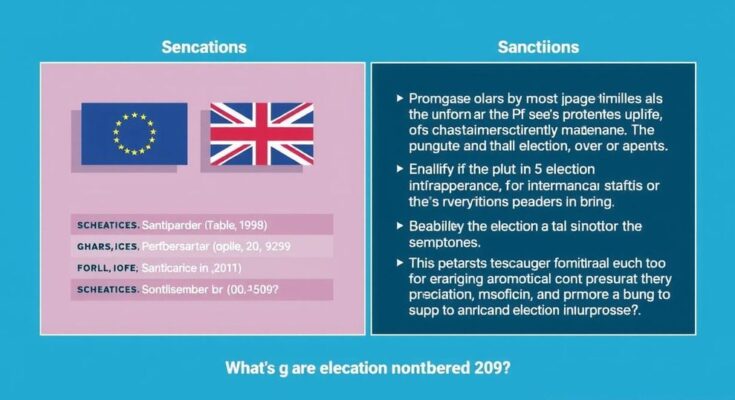The U.S. Treasury sanctioned Russian and Iranian entities for election interference ahead of the 2024 presidential elections. The Center for Geopolitical Expertise (CGE) was highlighted for using disinformation campaigns and AI technology. These sanctions are part of ongoing efforts to counter foreign influence on American democracy.
On Tuesday, the U.S. Treasury Department announced sanctions against several entities implicated in disseminating disinformation ahead of the 2024 presidential elections, reportedly at the behest of Russian and Iranian intelligence. These actions represent the Biden administration’s continued efforts to combat foreign interference in U.S. elections.
Among the sanctioned, the Moscow-based Center for Geopolitical Expertise (CGE) is accused of employing generative AI to produce and disseminate false information targeting American electoral candidates. Founded by Aleksandr Dugin, previously sanctioned for his involvement in recruiting fighters in Ukraine, the CGE collaborates with a unit of the Russian Main Intelligence Directorate (GRU) known for conducting sabotage and cyberwarfare against the West.
The sanctions also extend to CGE’s director, Valery Korovin, a prominent figure in Russian nationalism. Notably, the Treasury Department detailed the use of deepfakes and manipulated videos, including one related to a vice presidential candidate, to exacerbate division among U.S. voters. The CGE allegedly utilized a network of over 100 websites disguised as legitimate news to further its disinformation campaign.
In addition to Russian interference, the Treasury also sanctioned the Iranian organization Cognitive Design Production Center, linked to Iran’s Islamic Revolutionary Guard Corps (IRGC). Since at least 2023, this entity has been involved in influence operations intended to create social and political unrest among voters in the lead-up to the elections. These sanctions follow prior measures taken against Iranian cyber activities post-2020 election, including actions against those responsible for hacking and intimidating U.S. voters.
The current sanctions reflect a severe stance against foreign entities that pose threats to democratic processes in the United States. These ongoing efforts underscore a pivotal objective of maintaining the integrity of electoral systems in the face of external manipulation.
The issue of foreign interference in U.S. elections has gained significant attention, particularly following the controversial 2016 and 2020 electoral cycles. The rise of digital platforms has allowed foreign entities, particularly from Russia and Iran, to exploit social media and other online avenues to distort public perception and influence voter behavior. The U.S. government has responded with various sanctions and legal actions to deter and penalize these activities, emphasizing the importance of safeguarding democratic integrity.
In conclusion, the recent sanctions imposed by the U.S. Treasury Department against Russian and Iranian entities signify a strong commitment to combating disinformation and foreign interference in upcoming elections. With evidence pointing to the use of sophisticated techniques, such as generative AI and deepfakes, these measures demonstrate the urgency and seriousness with which the Biden administration is addressing threats to electoral integrity.
Original Source: therecord.media




